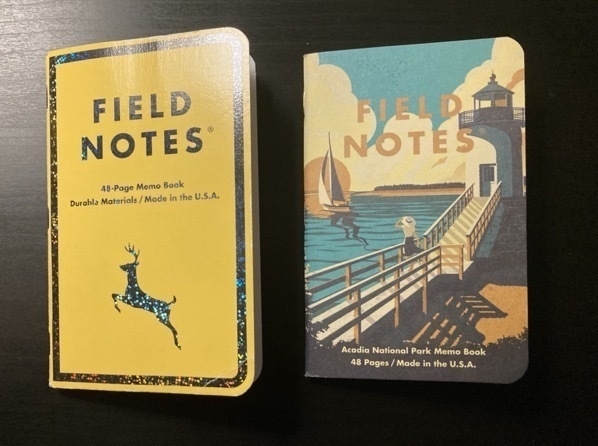Finished In December
#- Louise Glück, The Wild Iris (in Poems 1962–2012, FSG 2012)
- Natalie Diaz, Postcolonial Love Poem (Copper Canyon 2020)
A poem of mine, Thighbones, Clay, is up at Eunoia Review.
Another entry in the intermittently active Bookmarks series. This is actually a receipt not a bookmark, but I’ll allow it.
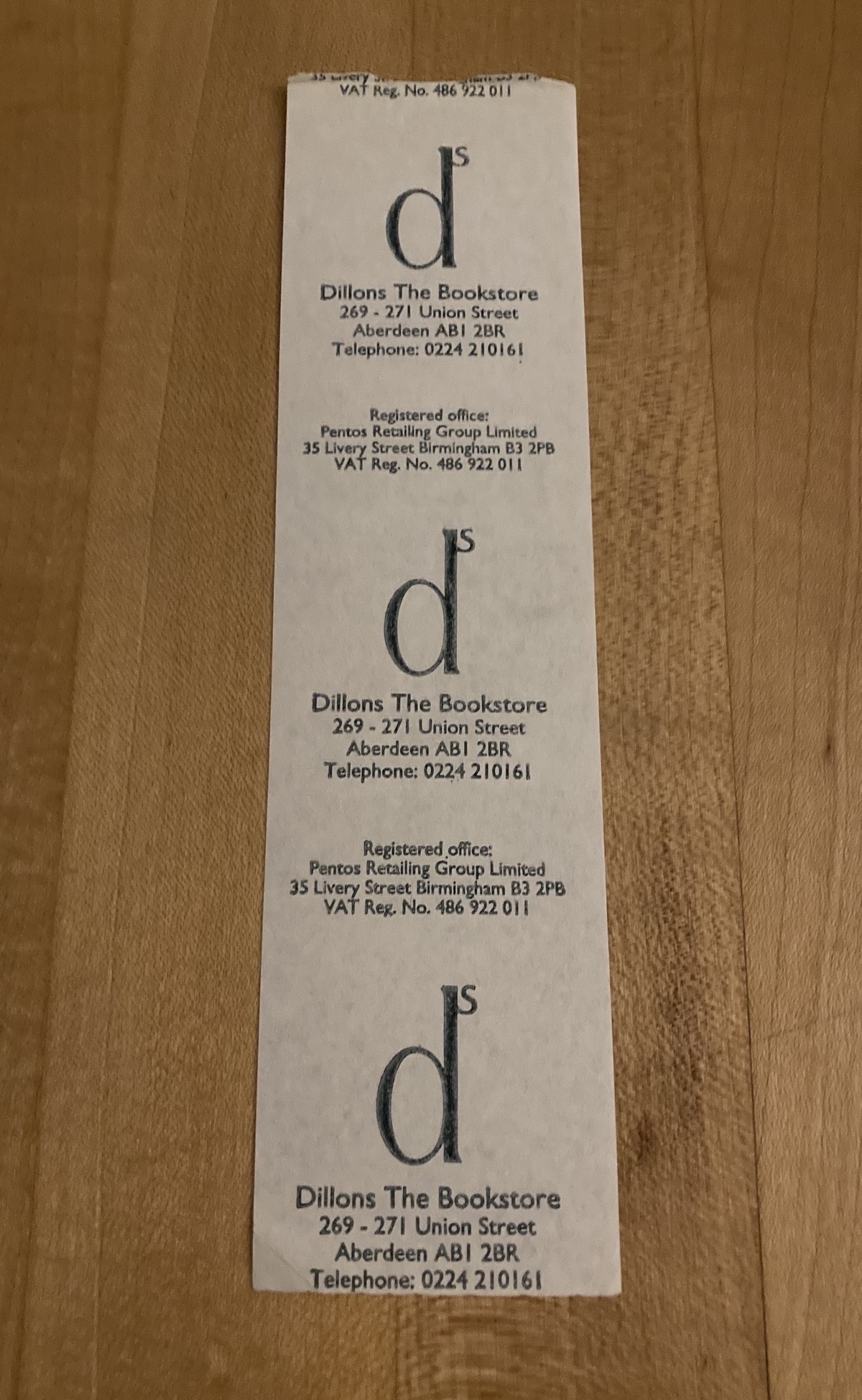
Sixty years ago today, one of the two men I was named after — my Opa Nicolaas — dropped dead suddenly as he was getting into a cab in ’s-Gravenhage, his arms laden with Sinterklaas presents.
72: United States of Letterpress (Starshaped Press)
73: Nat’l Parks (Denali)
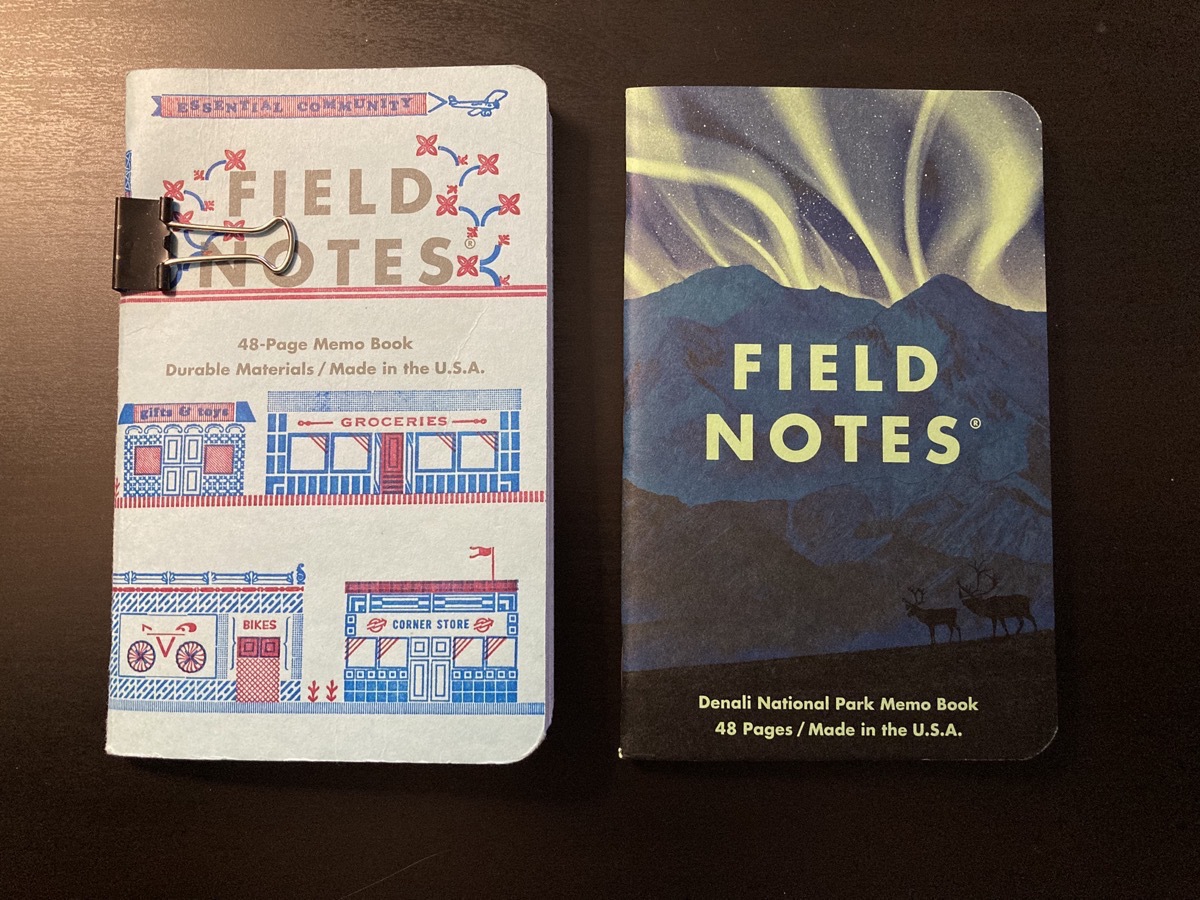
I’m appalled to discover I have a book-length manuscript of poetry written in 2020. How is this possible? I swear I spent the year hiding in bed or crushed in a chair staring blankly at the pages of one unread book or another. Frankly, I feel a little queasy that this shitshow year has been so productive for me.
A late entry to the Bookmark project. I pulled a book off the shelf just now and stumbled on this:
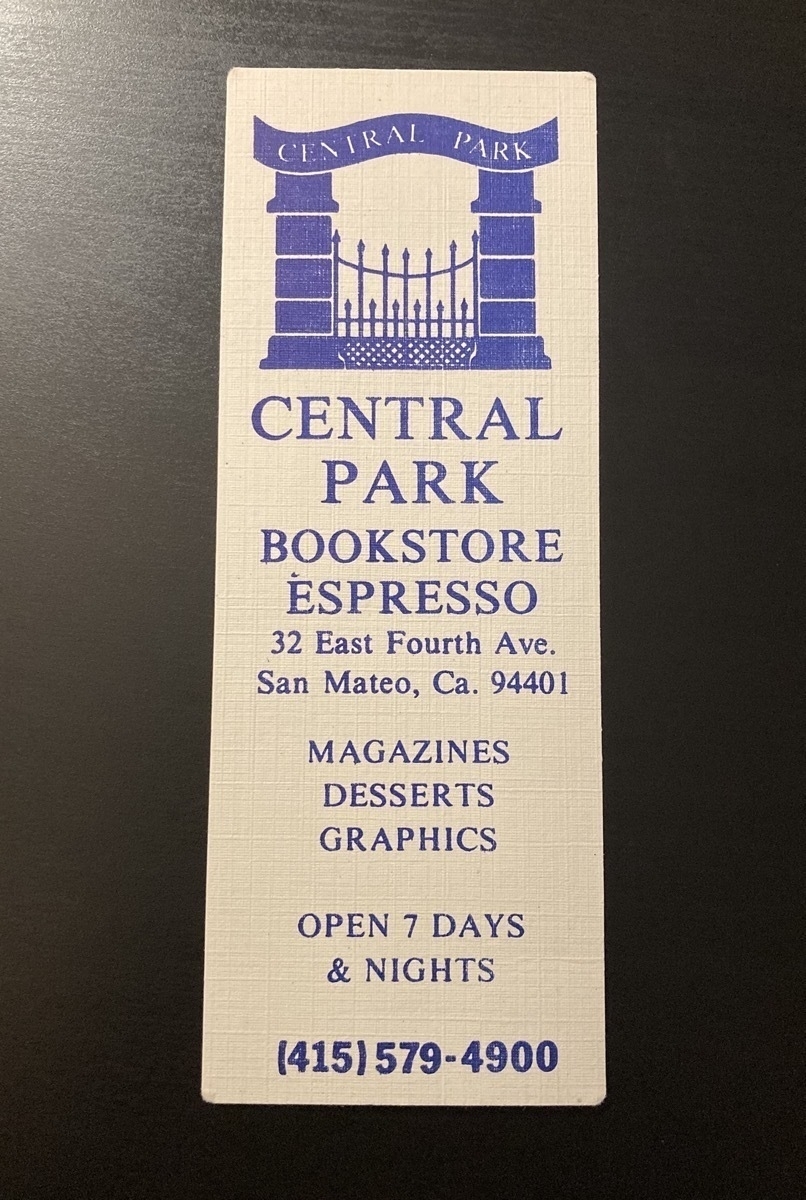
Well, it’s 8:45 on a Sunday night. Time to drink too much wine, revise old poems until they’re indecipherable, and listen to this on repeat.
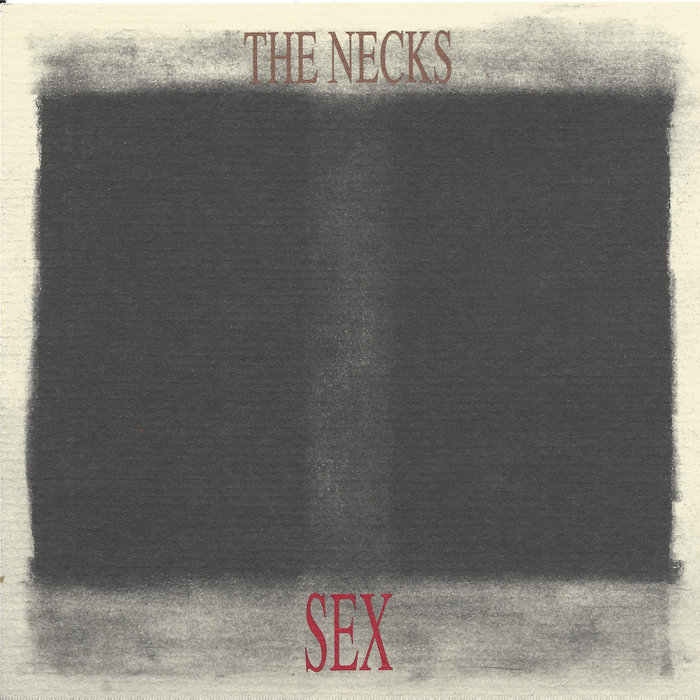
Are you looking through the bent-back tulips to see how the other half lives? Well, now you can satisfy your literary voyeurism without all that skulking under windows or peering furtively through the hedge!
Writer’s block is the unwillingness to crawl. — Eve L. Ewing
I wasn’t always an early riser, but at some point in the first year or so after college, I had a temp job that started at about six in the morning. For two months, in the darkest stretch of winter, I woke at four, stunned and blasted like an atomic atoll. I clung to my little kitchen table, stared blankly out at the silence. Then I drove through an empty city to a cold office behind an icy parking lot.
I soon moved onto my next job, which had very similar hours. And some semblance of a new routine began to coalesce. As the world slowly woke up around me. And I formed the habit of slowly waking up into writing by the window. I have remained an early riser ever since.
What I discovered almost immediately was that this early in the morning, the Artist is still sleepy and the Editor hasn’t even woken up, so no one is really thinking too hard about what’s being written down. Then, later on the day, when the Editor is in the Office and the Artist is ready to stare out the window with a glass of wine, the Editor can go over the pages, selecting, cutting, rearranging, maybe jotting down questions in the margins for the Artist to look at.
This sort of rhythm could have worked equally well, of course, had I stayed a night-owl: late nights for the Artist, the next morning for the Editor. This, in fact, was more or less what I’d already been doing. But that temp job helped me realize that there was something about the night-owl pattern that was not, in fact, working well for me anymore.
To this day, I keep a notebook open on the kitchen counter in the morning as I make my coffee. I call it my “Ongoing” notebook. I jot down sentence fragments, syllabic rhythms, snippets of nonsense. Sometimes only a few lines, sometimes a full page, sometimes — all too often — nothing. I fill about two or three of them each year.
With some variations, this has been my overall routine, even when it wasn’t. Something I’ve noticed about me: simply knowing I have a plan helps me get work done, even — or especially — if I don’t follow the plan.
But this year has been different.
Beginning in February, I stopped keeping an Ongoing notebook with me. I was just filling it with rants about the repugnant slug in the White House, or Covid. I’d stayed with it for a while, thinking that by letting those thoughts have their time, I could get them out of my head and I could move on with my morning. This had worked in the past. But now I found it actually amplified these thoughts, cementing them more firmly, which set the grim, desperate tone for the morning and for the day.
I decided I simply didn’t need to record these thoughts. It’s difficult for a writer to think that it’s okay not to write. But it is okay: let it flow past with the current. Watch it, but let it go.
Then, in March, I needed to prepare my home office to accommodate video conferencing when my day job switched to Distance Learning. As I shuffled things around, I discovered to my surprise that I had twenty-three Ongoing notebooks, going back to roughly 2011, which I had hardly been reviewing enough over the last few years. Instead, for most of this last decade, I was pushing on, filling more pages, filling more notebooks, with hardly a backward glance. How many poems were lying hidden in those years of messy first drafts? I decided to take some time to look at them again. I gathered them together – and, in the boring excitement that was March through May, I forgot about them.
In June, I noticed the stack in the corner, and I carried them to the kitchen table and finally got to work. Since late June, then, I have been slowly working my way through the Ongoings, an hour or so each weekend, two or three notebooks at a time.
Here’s what I’m doing.
1 — I skim each page with a red pen and post-it flags. If a passage, sentence, or a word catches my eye, I draw a quick red line down the margin, or box it, then flag the page.
2 — When I finish a notebook, I go back and cut the flagged pages out of the notebook and toss the excised sheets in a folder.
3 — After going through seven or ten notebooks, I quickly sort the accumulated loose sheets into three groups:
* “poem”
* “essay/blog”
* “???”
The key to these first three steps is quickly. I move fast and I don’t think too much. Thinking is for later. Am I going to miss some good stuff? Maybe. But what’s “good” anyway? I’m looking for interesting, for puzzling, for confounding. And if I overlook something, I’m not worried. It’ll be there the next time I pass through the notebooks. And my definition of “good” and my preoccupations will have shifted, so different things will catch my attention.
Okay, so now I have three stacks. This is what I do next — and, again, I try to move as quickly as possible:
4 — I go through each stack and sort them into smaller groups:
* beginnings and endings
* fragments in search of other fragments
* rough but whole
But what do I mean by “beginnings and endings”? And how do I know which fragments are seeking other fragments and which are just… fragments? Good questions. I don’t know, and I don’t really need to know. I’m basically chick-sexing here. It isn’t my job during the sorting to be able to defend why any fragment is going into one category rather than another. It doesn’t even matter if I’m wrong. The important thing is to put them somewhere.
And by putting the fragments into these broad, rough categories, I’m making the next stage just a little easier. That is, now I have fragments that are waiting either to be assembled, or expanded, or simply polished. This means I have a fairly good idea which activity I’ll be engaging in before I’ve even read a syllable of text.
Each of these — assembling, expanding, polishing — are, of course, very different activities and they involve different creative strategies. By matching the work with my energy level, I will be just a little less likely to burn out or feel overwhelmed as I begin my editing, or composing, or remixing.
This was a fairly easy process to develop, since it was a simplified, stripped down version of how I almost always build everything – songs, poems, essays, even email messages. I let fragments accrete then I allow coherence to develop through the accident of proximity. I listen for any odd or jarring leaps and I reshuffle things, either filling in those gaps or making the gaps wider.
The clean, chronological narrative of a final draft of writing is an illusion. We start with hunches and look for ways to explain them. Thoughts begin within webs of associations, and only later do we, with any luck, discover the strong supporting evidence that built them.
We start with meandering paths and dead ends, and only later do we present the final “short cut” that got us from there, to there, to there, to here. Whether you do all that wandering and orienteering “in your head” or on sheet after sheet of messy notebook pages, the work is unlikely to proceed in the orderly and logical progressions we present in our fastidious, crisp, spell-checked final drafts. Even logic is not nearly as logical as we think it is. There are wild, shocking leaps in even the simplest of syllogisms. We just craft them to seem like the leaps were inevitable. And who’s to say they weren’t? It all depends on where you were trying to leap to.
71: Autumn Trilogy (Elm)
72: United States of Letterpress (Starshaped Press)

A Day in the Life
Minneapolis, 05:30 CDT
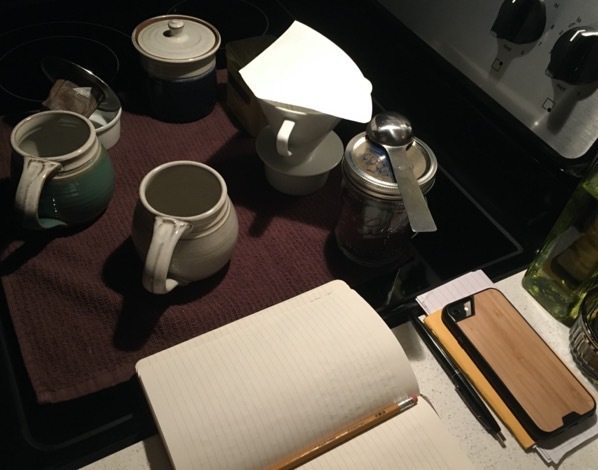
How I begin every morning
tea for her
coffee
and the blank page
for me
70: Kraft (lined)
71: Autumn Trilogy (Elm)

I’m suspending the “Finished” project for the rest of the year, for largely the same reasons I stopped this time last year: I tend to focus on rereads in the fall and winter.
There are several longer books I’m slowly working my way through, and I tend to move between them according to my mood each day. And my mood in the darker months is such that I will need my reading habits to serve my therapeutic, self-medicating needs rather than some goal of finishing books and then reporting out about it.
I’ll continue to keep my own log of finished books, and will post a recap of 2020 sometime close to New Years.
69: Nat’l Parks (Acadia)
70: Kraft (lined)
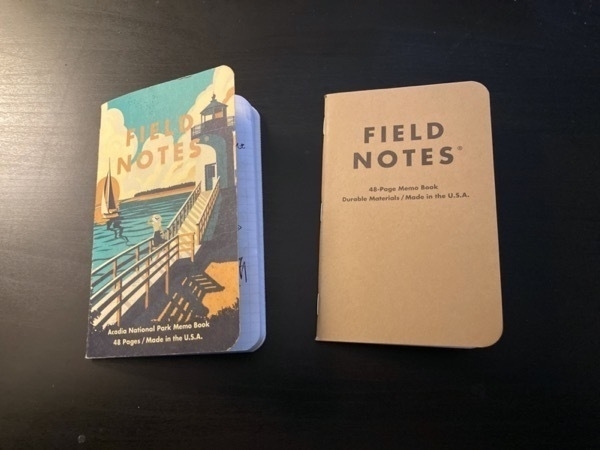
For a few days this week, I thought I would belatedly join in the Sealey Challenge. It did not go well. (I have some Very Deep Thoughts on this, but they will have to wait a few days.)
Beyond Belief: I bounced off this one hard when I first read it in 2003. I have no idea why, considering how absolutely up my alley all of Elaine Pagels’ books had been up to that point. My guess is that it’s because Beyond Belief is, at times, much more personal than her previous books, which I don’t think I was in a position to appreciate at the time. This book feels different, too, as though she was trying to stay focused yet kept taking in wider and wider vistas.
No Emo joke this week, sorry. And Irenaeus? Yep, still an asshole.
Hillman: Holy shit, is that an actual book of poems? Pledging to finish all the unfinished and unstarted poetry that was lying around is what started this whole thing off, waaay back in January of 2019. And poetry has been thin on the ground for a very long time. Who knows, maybe I’m ready to get back into all that. Tune in next week for another exciting episode.
This was my first reread of The Origin of Satan since ’96. Short version: Satan was invented largely by the cononical gospels as a counterpoint to the external enemy of Rome. “Satan” ceased to be the impersonal adversary or debate opponent of the Hebrew scriptures and swiftly bloomed into the personification of the intimate enemy within the then-incipient community of the early Jesus cult: first Judas; then the scribes and Jewish elders; then all Jews; and finally (once it had fully broken away from the Jewish world) any Christian who disagreed with orthodoxy (literally “straight thinking”). Satan is a textbook example of the narcissism of small differences.
Or as Emo Phillips puts it:
Once I saw this guy on a bridge about to jump. I said, “Don’t do it!” He said, “Nobody loves me.” I said, “God loves you. Do you believe in God?” He said, “Yes.” I said, “Are you a Christian or a Jew?” He said, “A Christian.”
I said, “Me, too! Protestant or Catholic?” He said, “Protestant.” I said, “Me, too! What franchise?” He said, “Baptist.”
I said, “Me, too! Northern Baptist or Southern Baptist?” He said, “Northern Baptist.”
I said, “Me, too! Northern Conservative Baptist or Northern Liberal Baptist?” He said, “Northern Conservative Baptist.”
I said, “Me, too! Northern Conservative Baptist Great Lakes Region, or Northern Conservative Baptist Eastern Region?” He said, “Northern Conservative Baptist Great Lakes Region.”
I said, “Me, too! Northern Conservative Baptist Great Lakes Region Council of 1879, or Northern Conservative Baptist Great Lakes Region Council of 1912?” He said, “Northern Conservative Baptist Great Lakes Region Council of 1912.”
I said, “Die, heretic!” And I pushed him over.
Also, Irenaeus is such an asshole.
68: Mile Marker (Deer)
69: Nat’l Parks (Acadia)
The Acadia is yar.
